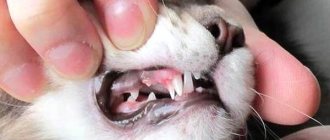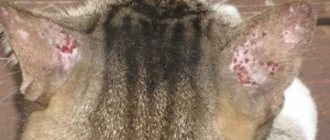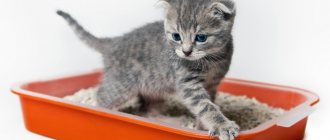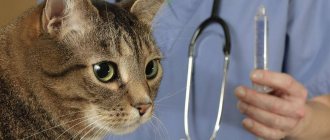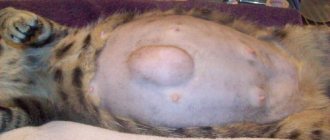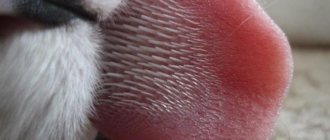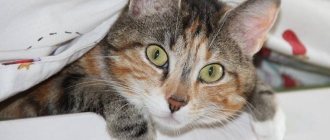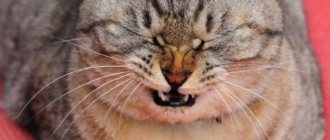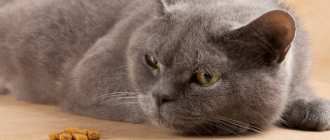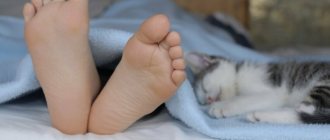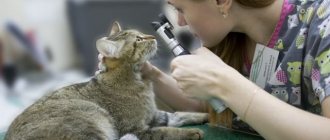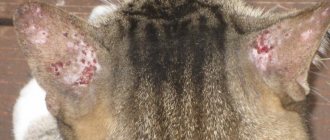Behavioral instincts
Most cats turn out to be real clean people and are willing to spend a lot of time licking their fur. This behavior is driven by natural instincts:
- Cleaning up after the hunt . Cats are predators, so after meals they need to remove the blood of their “prey” from their coats.
- Calming effect . This procedure calms the animal and relieves stress. It is believed that by cleaning the fur with their tongue, cats lick vitamin B from it, which is necessary for normalizing psychological balance.
- Disguise method . Washing is not just a standard ritual; cats use it to mask their scent. This allows wild animals to remain undetected for as long as possible during the hunt.
- Protective reflex . With their rough tongue they distribute fatty lubricant - secretory lard, which protects the coat and gives it elasticity.
- Purity. Licking is also a hygienic procedure, as a result of which cats keep their fur clean, including in the intimate area.
Fur coat length. As a rule, hairless and short-haired pets are easier to care for their skin and coat. But the owners of a luxurious, long fur coat are less fortunate. Often, access to “that very” place is difficult for them. And if a long-haired pet suddenly begins to “ride” along the floor on the “fifth point”, choosing rough surfaces, then it is worth looking under its tail and assessing the condition of the fur in this place. Perhaps dirt, fecal particles have stuck to it, tangles have appeared, or foreign objects, such as plant twigs, have become stuck.
Diarrhea is one of the reasons for “riding on the butt”
Cats suffering from diarrhea may clean their butts on the flooring, carpet or other rough surface. In this case, the behavior of the animals has nothing to do with the quality and length of their fur. Thanks to friction, the pet tries to solve two problems at once:
- Get rid of extraneous, unpleasant odor.
- Eliminate itching sensations that occur due to irritation of the mucous membrane in the anal area.
Treatment. When the cat does not have frequent bowel movements, but is bothered by itching, veterinarians recommend using rectal suppositories that have enveloping and antibacterial properties.
During the recovery period, the animal should not push too hard, so it is prescribed a light diet.
Anal sinus problems
All cats have anal sinuses, located inside the anus. These sinuses contain a dark, odorous and oily fluid that is released along with feces during defecation and “marks” them with the smell of that particular animal. If you look closely at a cat's anus, you will notice two small dark dots, which are the canals of the anal sinuses. They can become clogged, causing the cat to feel irritation in the anus area
, which she seeks to remove by rubbing her butt. In severe cases, inflammation may develop, which will be even more painful and unpleasant for the cat.
The veterinarian can clean the anal sinuses, and if they become clogged frequently, he can show the cat’s owner how to do this at home.
Possible pathological disorders
Unfortunately, diarrhea and dirty fur are not the only factors that cause a cat to ride on its butt. There are also more serious factors that lead to this behavior, for example:
- mental health disorder;
- post-traumatic stress disorder;
- helminthic infestation;
- paraanal inflammation.
Each of the diseases deserves attention and requires consultation with a veterinarian. In addition, they are accompanied by other symptoms, in addition to “travels on the fifth point”.
Signs of mental disorder
With mental disorders caused by stress, the pet's behavior changes noticeably and becomes strange. The cat can:
- show aggression;
- avoid communication, including with the owner;
- lose appetite.
The owner may notice that the pet begins to crawl on the floor, regardless of toilet procedures. In this case, it is recommended to immediately contact a specialist who will identify the pathology and prescribe appropriate therapy.
Phantom pain syndrome
After an injury to the hind legs or a fracture of the hip joint, the pet begins to look for a way to eliminate phantom soreness. He rolls on the floor, trying to get rid of the pain that is lingering in his brain. In such a situation, veterinarians prescribe medications that have a mild sedative effect to the animal. They help him cope with excruciating post-traumatic discomfort.
Parasite infestation
Most often, pets get pinworms and tapeworms, which live in the large intestine. To reproduce, many of them have to crawl to the entrance to the anus to lay eggs. This process is accompanied by a feeling of severe itching, which the pet tries to get rid of by crawling on the floor.
When infected with tapeworms, a feeling of bloating occurs in the intestines. The cat strives to get rid of feces, stimulating the anus while riding on the floor and causing defecation. To save your pet from such difficulties, you should regularly deworm it, using anthelmintic drugs for preventive purposes. These can be tablets for oral administration, drops on the withers area or other means.
Blockage of the anal glands
Mustachioed striped animals have anal glands, which are muscular sacs located in close proximity to the anus. They constantly produce secretions that are released through the ducts during bowel movements. It gives feces and urine a specific odor, allowing cats to leave “fragrant” marks on their territory.
Norm and deviations. In its normal state, the secretion is a thick, odorous substance. If the glands are not completely emptied, then corresponding disorders arise:
- the tissues of the muscle sacs are “overstretched”;
- irritation occurs in the glandular ducts;
- dermatological problems arise - small inflamed seals and bald spots form in the neck and along the spine;
- the paraanal glands swell greatly and become visible under the animal’s tail.
Consequences. If the owner does not pay attention to the blockage in time, then the disruption of circulation ends with the formation of a fistula and the penetration of the contents of the glands into the peritoneum.
Helminths in cats
In cases where a cat moves its butt on the floor regardless of going to the restroom, the problem may be infection with helminths. The owner needs to carefully examine the animal’s anus and examine the contents of the tray. Heavy infection of a cat with worms, which is accompanied by itching, cannot go unnoticed, since the parasites are always found in the feces.
This problem is most often encountered by either very young kittens or naturally fed animals. Insufficiently processed meat and fish retain worm eggs, so infection of a pet can occur even if the cat is not outside.
You may be interested in: The cat began to sneeze frequently: causes and dangerous symptoms
Treatment consists of taking anti-worm medications. Such medications are toxic and can cause poisoning of the animal, so they must be selected by a veterinarian.
It is necessary to take your pet to the doctor and undergo a stool test, based on the results of which the veterinarian will select the optimal drug for treatment.
In some cases, simultaneous anthelmintic therapy may be required for all family members and other animals living in the house, since worm eggs easily enter the body upon contact with an infected animal.
Poor diet and low mobility
Common factors leading to butt riding include:
- physical inactivity;
- excess body weight;
- high-calorie foods.
Unfortunately, even among cats there are often lazy people who lead a sedentary lifestyle. With obesity and low activity, changes occur in the animal’s body and the place of muscles is replaced by a fat layer. The tissues are compressed and the circulation of the anal ducts is disrupted.
Excess calories affect the functions of internal organs, which leads to the development of diarrhea. With frequent bowel movements, the odorous secretion does not mix with feces, remaining on the skin, causing irritation and itching. And in this case, the pet will ride on the floor, trying to reduce discomfort.
Treatment
The next reason for your pet's strange behavior may be attracting attention. If a cat once rode on its butt for good reasons and remembered that the owner reacted to this, then in the future she can use this trick to try to communicate with the owner.
If an animal rides on its butt and calms down after the owner has petted it or talked to it, then such behavior can be considered a cry of despair. Many pets misbehave precisely in order to attract attention. We should not forget that the cat is very social, but it does not go to the store or to work, it has no one except its owner.
In rare cases, and only after an individual assessment, a veterinarian can make a diagnosis related to mental problems. Animals that have experienced fractures, trauma, or severe stress may behave strangely without being sick. After fractures or similar injuries, your cat may experience itching and phantom pain, similar to wearing a diaper or cast.
The correct treatment depends on the correct diagnosis and may be as follows:
- Cleaning the anal glands
- Antibiotics
- Surgical opening of abscesses
- Steroid therapy
- Hair removal around the anal area
- Anti-inflammatory drugs
- Use of antihistamines and corticosteroids
- Elizabethan collar to prevent licking of the anal area
- Preparations for getting rid of parasites
- Surgical removal of tumors and anal glands
We invite you to read: Why does a cat not drink after sterilization?
Metabolic disorder
Failures in metabolic processes lead to various disturbances in the functioning of the animal’s body. As a result, the consistency of secretory secretions often changes; they can become too thick and clog the ducts. Sometimes the glands begin to secrete more secretions than usual. In both cases, the skin becomes irritated, inflammation, swelling and itching occur. If the pet is not helped, then the risks of developing complications are high:
- The animal begins to actively move along the floor, which causes damage to the skin near the anus.
- The wounds become infected and an inflammatory process develops. The most dangerous thing is infection of ulceration by pathogenic bacteria.
- If left untreated, the inflammatory process spreads to the peritoneum.
Such violations lead to the pet becoming too restless. He can't find a place for himself and drives furiously at the fifth point.
If an animal has a weakened immune system, then there is a risk of developing infectious blood poisoning.
Also watch the video why a pet rides on its butt:
Why does a cat roll on the floor on its back?
Riding on its back is considered normal for a cat if it enjoys it. You should be wary when an animal does this constantly or rubs too much on the floor.
Most of the reasons that make your pet want to lie on its back are completely harmless, but you may encounter a problem that requires treatment.
Physiological needs of a cat
The most common reasons why a cat rolls on its back are:
- 1. The desire to scratch your back.
The animal is not able to reach its back with its paws, so it has to periodically lie on its back to scratch itself. - 2. Manifestation of instincts or just a game.
In the cat family, unlike dogs, the dominant one in the pair falls on his back. From the outside it may seem that he is defeated, but in fact this is how the animal gets the opportunity to inflict a strong blow on the enemy with its hind legs. When a cat is playing and rolling on the floor on its back, you should not reach out to it, it will take it as a challenge and attack. Even if the pet is just playing, sharp claws can seriously hurt, so at such moments you need to be careful around the animal. - 3. Sexual hunting.
If the animal does not have breeding value, experts recommend sterilization. This is due to the torment that the pet experiences every time due to strong hormonal changes, and with a high risk of diseases of the genitourinary system. It has been proven that sterilized cats live up to 3 years longer than those who regularly go into estrus, that is, do not become pregnant at the right time. - 4. Relaxation and stress management.
Some cats behave this way to calm down and may roll on their back after a slight fright or mild stress, getting rid of it in this way. This is considered normal if the pet does not experience significant discomfort and is not tense. - 5. Foreign odor that the animal tries to eliminate with its own.
Then the cat rubs its back not only against the floor, but also against various things and objects. As soon as the pet becomes satisfied with the result of its actions, it loses interest in this activity.
If your cat's piggyback ride is related to one of these options, there is nothing to worry about. This behavior does not require intervention, much less treatment. An exception can be considered sterilization, but this is not a mandatory method, but a recommendation from specialists. This way it will be calmer for all household members and the cat itself, because even if the animal does not meow loudly, it suffers.
- 2. Felted fur causes a lot of inconvenience to the animal.
Long-haired cat breeds suffer from this constantly, so regular brushing is essential. But pets with short hair do not always cope on their own, especially in the back area. To solve the problem, just choose the most suitable comb and regularly remove excess hair. With this care, the cat will swallow less hair, which will have a positive effect on its digestive system. - 3. Infections with various forms of fungi can cause itching and rolling on the back.
It is impossible to find out which type of infection has affected the animal without tests, so self-treatment in this case is unacceptable. Depending on the degree of development of the disease, local therapy or complex treatment is selected. The risk of fungal infection is high, even if the pet does not leave the house.
Each of the possible causes requires timely intervention in order to relieve the animal from discomfort as quickly as possible. If treatment is necessary, consultation with a veterinarian is mandatory. It is almost impossible to choose the most effective drug for a cat at home, and treatment at random often causes various complications.
